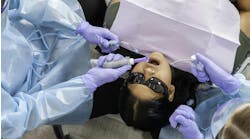You’re busy, so when the public relations (PR) representative contacts you, all of these messages sound good. You can simply hand your communications over to them and get back to your daily responsibilities. Soon, your phone will ring with requests for media interviews and patient appointments, and everyone will know who you are and what you do.
Hold on! You need to know the truth behind that exciting offer.
While public relations can provide third-party credibility and awareness you can’t get in any other way, there are some things you need to know before you sign on that dotted line.
5 questions to ask that potential PR firm
1. What is “top media,” anyway?
What exactly does it mean when they tell you they’ll get you on “top media”? Are these media placements on websites and interview platforms that they own? Do your audience members actually pay attention to these media venues and give them credibility?
If a firm guarantees media placements, watch out! This means that they are using their own platforms or buying placements, which focuses on advertising and not PR. Per the Public Relations Society of America, “public relations is a strategic communication process that builds mutually beneficial relationships between organizations and their publics.”1
With this in mind, the most cost-effective PR results come from having a strategic plan with targeted communications that focus on organic placements. This is where a credible third-party media venue interviews you and produces a story about you that you didn’t pay to be in and that your target market actually views. This process takes a lot of time and effort, so many PR firms just do paid placements.
2. Who is really working on your account?
Fantastic! That high-powered celebrity PR firm wants you as a client. This can be very enticing, but once you pay the big bucks for representation, what happens? You may not hear from them for awhile or even have their intern working for you without even knowing it!
Money talks. These firms often give top priority to celebrities and brand names because they are easier to pitch, and they can make more money off of them, too. A bigger firm isn’t always better.
3. How do they represent you?
Some of the new “firms” think that “PR” means “press release.” It is very easy to use a templated press release for each client and distribute it. Sure, you get online news postings immediately, but how unique is that information? Is your PR firm using the same template for all of their clients? Your news may be same as your competition’s!
Also, if your PR firm uses one of the “cheap” distribution services, there will be a link in the press release that leads back to their site. Where does that link go? How does it represent your business? Once your press release is live, you will be associated with that link because that PR firm represented you when they distributed the press release. This stays online forever. If it’s a bad site marketing services that look shady, you just hurt your reputation instead of sharing positive news! Good luck fixing that.
4. Are you working with a tech firm or a PR expert?
Many tech firms will sell PR services where they’ll optimize your press release for the search engines, write your website content, blogs, and marketing materials, distribute your news, and basically handle everything. This is a bad idea.
Public relations is all about storytelling and sharing the right message with the right people at the right time.
This means that you need an experienced publicist actually talking to a specific media person on the phone one-on-one and pitching your unique story to them. Plus, your content needs to be written by someone who knows how to share emotions, your personal stories, insights, tone, and style—something AI cannot do.
Tech people do not know how to do this unless they are also experienced publicists and SEO copywriters! Also, what happens if you have a communications crisis that could ruin your reputation? Does your tech person know how to deal with this, and are they available to do so?
5. What are you really paying for?
Your PR firm should be transparent with you, so you know what’s going on at all times. After all, good publicity is all about communications.
In addition to regular meetings with your PR expert, request a monthly report that shows what happened that month and what will be happening in the future. This may include updates to your online newsroom, editorial calendar, articles, media training notes, stats on published clippings, upcoming events, speaking opportunities, award entries, competitor SEO data, and more.
If your PR firm provides a report with a lot of technical jargon that you don’t understand, ask for more details. It’s important to know what is happening with your publicity each month without hidden activities or fees. If your representative can’t provide details, this is a warning that something fishy is going on!
Take the time to hire the right person
To find a good PR expert, ask associates for recommendations, check the Better Business Bureau for reputable firms and conduct online research to find real reviews of various firms.
Then, when you find a potential PR representative to work with, ask questions. Find out exactly what you will receive, how they will perform their services specifically for you, who you’ll be working with, time frames, fees, and other data relevant to your needs. Also note that reputable firms provide a trial period, so if the relationship doesn’t work out, either party can exit without continuing to waste resources.
These extra steps are worth it. Why? You’ll enjoy the competitive advantage that only true public relations can provide, and you'll see patients, sales, and awareness increase. Plus, you can relax knowing that your PR expert is looking out for you and managing your communications the right way.
Editor's note: This article appeared in the April 2024 print edition of Dental Economics magazine. Dentists in North America are eligible for a complimentary print subscription. Sign up here.
Reference
- About public relations. Public Relations Society of America. https://www.prsa.org/about/all-about-pr
bio







